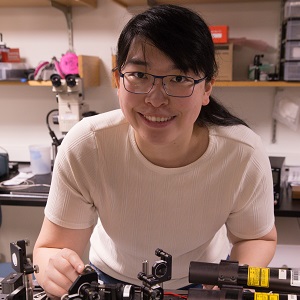Linhui Yu - 2022 SPIE Women in Optics Planner
Research Fellow
Wellman Center for Photomedicine, Massachusetts General Hospital,
Harvard Medical School, USA
SPIE Early Career Professional Member
 |
Born in China |
I grew up on the campus of a research institute in China. When I was a kid, I was surrounded by a lot of professors and researchers as neighbors. Both my parents are researchers in agriculture, and they always talked about science in life. For example, when we went on a field trip, they would spend a decent amount of time discussing the plants we saw and which species/ classes they may belong to. When we came across a farm, they would discuss the impact of weather on different crops. Since an early age, I have always wanted to learn more, so that I could join those mini discussions.
As a research fellow in the Wellman Center, my work focuses on the development and optimization of optical techniques for measuring the structural and functional information of biological tissue. These systems can be utilized for both basic scientific research and clinical applications. My responsibilities range from hardware development and instrumentation, to system validations in experiments with excised tissue, cell cultures, and sometimes in animals and humans. I also develop numerical models to extract the parameters of interests, for example, the stiffness of biological samples, the velocity of flow, and small-particle motions.
The biggest challenge I face is overcoming Imposter Syndrome. The voice of my inner critic always tells me that I am not good enough, and that I must try to be better. It used to prevent me from accepting challenges or exploring opportunities. A mentor once told me: “Don’t compare to your perfect self. Accept who you are now, set up a workable plan to get closer to your goal, and keep moving.” Now I realize that my inner criticism may not always be correct. I say yes to challenges and try my best. I accept Imposter Syndrome as a life-long challenge and an opportunity for active learning and self-improvement.
I wish someone had advised me of the importance of self-care when I was first starting out. I was always told to work hard, explore different fields, and seize all opportunities. I learned the importance of self-care the hard way, through burnout in graduate school and almost quitting my PhD. I hope everyone can balance the demands of work and life and take care of their own needs and well-being first.
I recommend that anyone who finds happiness and passion in discovering new things, expanding understanding, or solving real-life problems should follow their heart and explore STEM career choices. Don’t be afraid to ask questions and make mistakes. Don’t give up just because someone tells you STEM is difficult and demanding. Surround yourself with like-minded peers and supportive mentors and give back to your communities whenever you can.